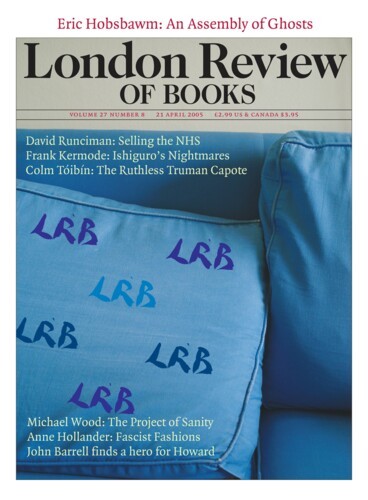On 9 June 1983, my father took my elder sister and me to the village hall to vote against Margaret Thatcher. We were only small, so we went with him into the polling booth. He gave my sister the pencil and pointed to where she should draw the first line of a cross, then let me draw the second. All highly irregular, no doubt, though even if his ballot had been discounted it wouldn’t have made any difference: the new Conservative MP for Basingstoke, Andrew Hunter, would just have been elected with a majority of 12,451 rather than 12,450.
Hunter won’t be seeking re-election in May, having seen his majority – which peaked in 1992 at 21,198, making Basingstoke an apparently unassailable Tory stronghold – dwindle to a meagre 880 in 2001. A member of the Orange Order, he was one of the few MPs to vote against the Good Friday Agreement (or, as he puts it, ‘one of only a handful of mainland MPs who have consistently opposed the sell-out to terrorism in Northern Ireland’). He resigned from the Conservative Party in October 2002 so that he could stand for Ian Paisley’s DUP in Lagan Valley in the 2003 Northern Ireland Assembly elections. He didn’t win. In December last year, still Basingstoke’s MP, he joined the DUP anyway, which caused some consternation, though it should hardly have come as a surprise. The local Conservatives found it ‘sad’; one more sanguine resident told a national newspaper that everyone needed to have a hobby. The Labour prospective parliamentary candidate, Paul Harvey, called for a by-election; he was ignored.
By the time of his defection to the DUP, the Tories should have got used to being embarrassed by Hunter’s opinions. Iain Duncan Smith’s leadership campaign was temporarily hobbled by the Basingstoke MP’s support, when Hunter’s links to the Monday Club and the magazine Right Now!, both of which promoted the idea of paying immigrants to leave the country, were publicised. The Monday Club’s other ‘aims’ and ‘views’ appear, in their most reasonably expressed form, on the group’s website: in favour of the monarchy, ‘Christian teaching and morals’ and capital punishment; opposed to Europe, foreigners generally and taxation (abolishing death duties and capital gains tax, they say, would save the exchequer millions of pounds and reduce the national debt; it’s not clear how). Under pressure from Duncan Smith, Hunter resigned from the organisation in October 2001.
Anyway, the Basingstoke Gazette has printed its by-line picture of a pipe-wielding Hunter at the head of his ‘How I See It’ column for the last time; Conservatism in Basingstoke has a new face. Maria Miller is a working mother of three, campaigning vigorously on local issues: education, ‘local environment improvement’ and crime. She ought to win easily. The constituency, a hotbed of affluence, has returned a Tory in every election since World War Two. Part of the reason for the near-miss of 2001, Hunter’s increasingly hard to ignore eccentricities aside, had to do with boundary changes: a number of staunchly Tory outlying villages, like the one where my parents live, were lassoed by Hampshire North-West, which Sir George Young (Con, obviously) retained in 2001 with a swollen majority of 12,009. Ever decreasing turn-out probably didn’t help Hunter: Basingstoke’s citizens have followed the national trend of not bothering to vote, though they’ve always been slightly more inclined than average to go the polls – in 1992, turn-out was almost 83 per cent; in 2001, just over 60 per cent. But the biggest reason for the closeness of the race in Basingstoke last time around must have been the buoyancy of New Labour at the end of their first term. What a very long time ago that now seems.
The projected swing to the Tories next month will involve not only the gain of marginal seats from Labour, but the growth of existing majorities. In that sense, Basingstoke is likely to be typical. It’s also typical to the extent that Miller’s ‘local’ issues are, unsurprisingly, Michael Howard’s parochial policies embellished with a few north Hampshire curlicues: Basingstoke families are paying more tax, which isn’t being spent on them; violent crime in the town has increased by 30 per cent in the past year (if you overlook changes in the way the figures are calculated), a trend that can be reversed by ‘cutting bureaucracy’ to give the police more time out on the streets; those who already live in the houses built in Basingstoke over the last thirty years are said not to ‘want any more large-scale high-density developments’ in their back yards.
As in the rest of the country, people in Basingstoke who think like that will have an easy decision to make on 5 May, including disenchanted Blairites on the right. The disillusioned on the left will have a trickier time of it: those who vote Tory in Basingstoke next month are likely to be outnumbered only by those who stay at home, and possibly their children.
Send Letters To:
The Editor
London Review of Books,
28 Little Russell Street
London, WC1A 2HN
letters@lrb.co.uk
Please include name, address, and a telephone number.

